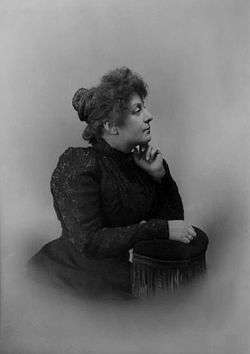Anastasiya Verbitskaya
| Anastasiya Verbitskaya | |
|---|---|
 | |
| Born |
22 February 1861 Voronezh, Russia |
| Died |
16 January 1928 (aged 66) Moscow, Soviet Union |
| Period | 1880s-1920s |
| Genre | Fiction, Drama, Movies |
Anastasiya Alekseyevna Verbitskaya (Russian: Анастаси́я Алексе́евна Верби́цкая), (22 February 1861 – 16 January 1928), was a Russian novelist, playwright, screenplay writer, publisher and feminist.[1]
Early life
Verbitskaya was born in Voronezh, where her father was a professional military serviceman, and her mother was an amateur actress. In the mid-1870s Verbitskaya attended a boarding school, the Elizavetinsky Women's Institute in Moscow. In 1879 she entered the Moscow Conservatory to study singing, leaving after two years to take a job as a music teacher at her former boarding school. In 1882 she married Alexey Verbitsky, an engineer, with whom she had three sons.[2][3]
Career

After her marriage, she worked at various jobs, obtaining her first position at a newspaper in 1883. Her first work of fiction, a novella entitled Discord, appeared in 1887 in the journal Russian Thought. The work espoused the theme of women's liberation, independence and personal fulfillment.
She produced her first novel, Vavochka in 1898. She also wrote plays, including the comedy Mirages (1895), which was staged at the Maly Theater. In 1902, she created her own publishing house, issuing her works and the translated novels of Western European writers dealing with women's issues. She continued to demonstrate her commitment to the liberation of women through extra-literary activities: She was a member of various charitable and civic organizations that helped women, becoming the chair of the Society for the Betterment of Women's Welfare in 1905.
After the 1905 revolution, with the censorship greatly reduced, she wrote the first of her popular novels, Spirit of the Time (1907–1908). This and her next novel, The Keys to Happiness, in six volumes (1908–1913), were bestsellers.[4] She combined political, philosophical, and aesthetic concerns with frequent scenes of sexual seduction. Both of these novels sold in numbers that were unequaled in Verbitskaya's day. She also wrote her two-volume autobiography To My Reader (1908 and 1911) while she was writing The Keys to Happiness.
In 1913 she was invited to write the screenplay for a full-length film based on the novel Keys to Happiness. The film was a great box-office success, leading her into a movie career.[2][3]
Later life
After the Russian Revolution of 1917, her career suffered because of official scorn for her "bourgeois" novels. She died in Moscow in 1928.
Three of her popular novels were reprinted in Russia in 1992 and 1993.[2][3] An abridged version of her novel Keys to Happiness was published in English in 1999.
English translations
- Keys to Happiness: A Novel, Beth Holmgren, Helena Goscilo, Indiana University Press, May 1, 1999.
References
- ↑ The Great Soviet Encyclopedia, 3rd Edition (1970-1979). 2010, The Gale Group, Inc.
- 1 2 3 Article on Verbitskaya from Ask.com
- 1 2 3 , Introduction to Keys to Happiness: A Novel, Beth Holmgren, Helena Goscilo, Indiana University Press, May 1, 1999.
- ↑ St. Petersburg: A Cultural History by Solomon Volkov, tr. Antonina W. Bouis, Free Press, 1997